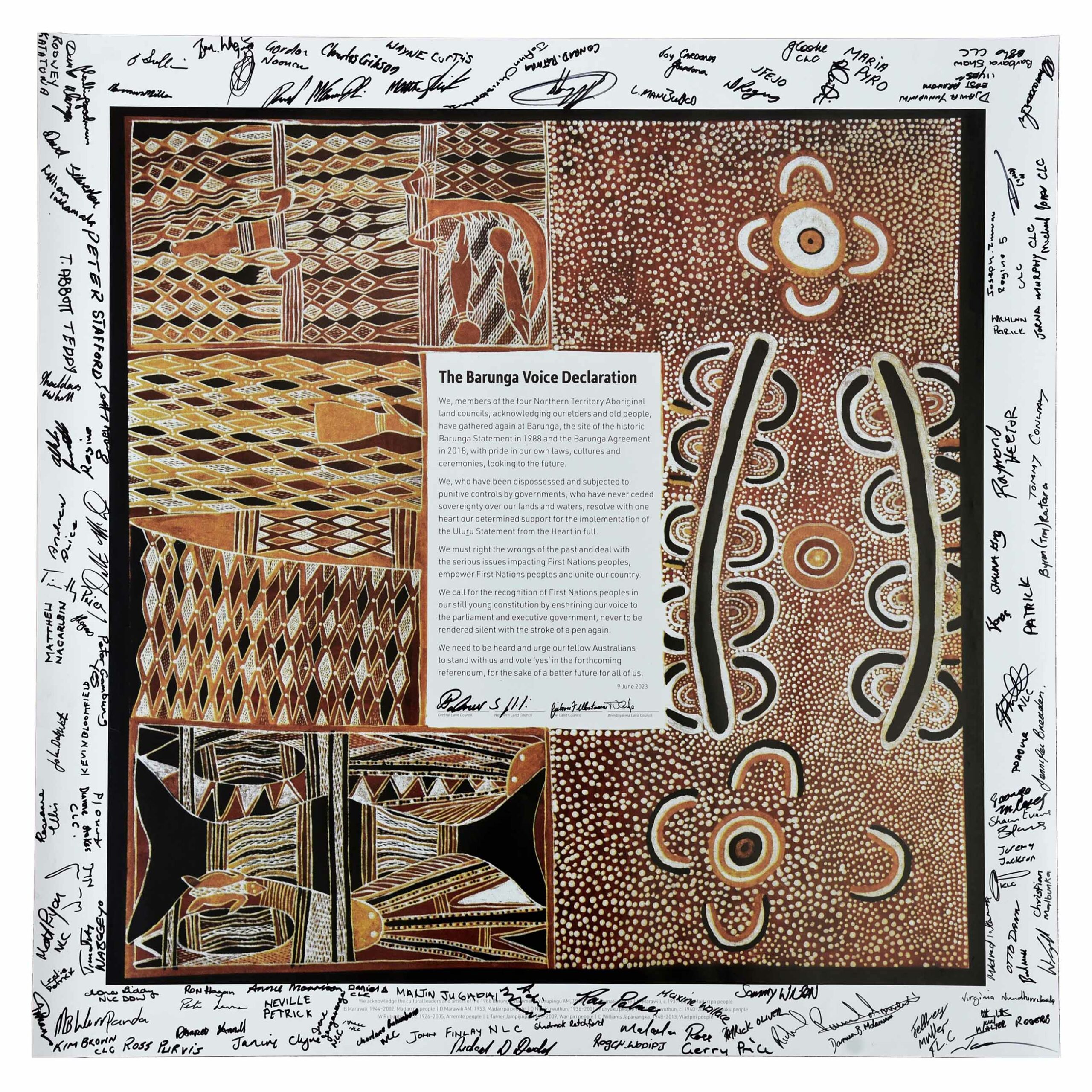
Tag: Uluru Statement


The chairs of the four Northern Territory Aboriginal land councils will visit Parliament House in Canberra tomorrow to deliver the 2023 Barunga Declaration urging Australians to support a Voice to Parliament.
The chairs and members of the land councils are elected representatives of tens of thousands of traditional owners and Aboriginal residents of remote communities, homelands, town camps and towns across the NT.
The four chairs will present the Barunga Declaration to Prime Minister Anthony Albanese.
On 9 June, members of the Northern, Central, Tiwi and Anindilyakwa land councils signed the Declaration at Barunga on the anniversary of the 1988 Barunga Statement that was presented to then Prime Minister Bob Hawke.
Thirty-five years ago the Central and Northern land council chairs Wenten Rubuntja and Yunupingu addressed the leader of the Federal Government and called for Aboriginal recognition and rights.

Today, the 2023 Barunga Declaration speaks directly to the people of Australia and calls for “the recognition of our peoples in our still young constitution by enshrining our voice to the parliament and executive government, never to be rendered silent with the stroke of a pen again”.
It invites all Australians to “right the wrongs of the past and deal with the serious issues impacting First Nations peoples…and unite our country”.
Northern Land Council chair, Dr Samuel Bush-Blanasi, said: “This Declaration comes from our people. It is the voice from the bush calling on all Australians to recognise us, support us, and help us make the changes so urgently needed for a better future, together.”
Tiwi Land Council chair, Gibson Farmer Illortaminni, said: “Through the establishment of a Voice to Parliament, we, the Tiwi people, want to be at the table when decisions are made that affect our land, culture, and future. We urge all Australians to join us to ensure our voices are heard and respected when important decisions are being made that affect us”.
“The Barunga Declaration deserves to hang alongside the Barunga Statement on the walls of the people’s house for all times and make future generations of Australians proud,” Central Land Council chair Matthew Palmer said.
Anindilyakwa Land Council chair, Tony Wurramarrba, said: “We want our voices to always be heard in the parliament and by the government before decisions are made about us. Business as usual has failed us. We are here to ask all Australians to help us open the door to a better way of working together and vote yes in the referendum.”
Watch grass-roots members of the land councils signing the agreement
Time and venue of the media event to be confirmed by Prime Minister’s Office.
Watch the video without subtitles
Media contacts (at Parliament House): CLC Elke Wiesmann 0417 877 579, NLC Francine Chinn 0427 031 382
On 14 October Australia voted NO.
But Aboriginal people in all our Central Land Council communities voted YES. In fact, Aboriginal and Torres Strait Islander people all over remote Australia voted YES.
The referendum results tell us an important story:
We as Aboriginal and Torres Strait Islander people are united.
We know who we are.
We know what we need. And we know things need to change. But we live in a country that does not know itself.
Our people are grieving.
Those of us who have been around for a long time recognise how it feels. We have been here before.
We are sad, but we know that we must stay strong.
Others in our communities, especially young people, are in shock and disbelief.
We need to work together and support each other.
CLC leaders and elders created a legacy of fighting to improve the lives of our people.
The CLC will never stop advocating for our rights.
We will keep fighting for equality, fighting for land, fighting for water, fighting for housing, infrastructure, good jobs, education, closing the gap – a future for our children.
While we are disappointed with the outcome of the referendum, we recognise the courage of the Prime Minister Mr Albanese and thank him for providing Australia with an opportunity to vote for change.
The CLC members and staff thank all Australians who stood with us.
Download the PDF
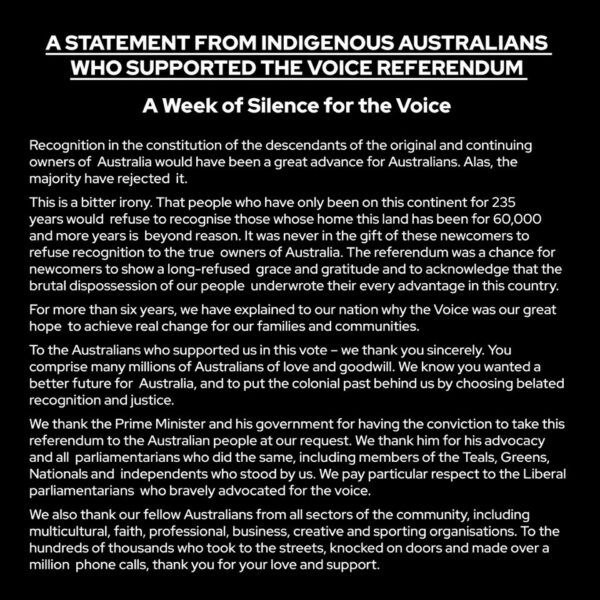
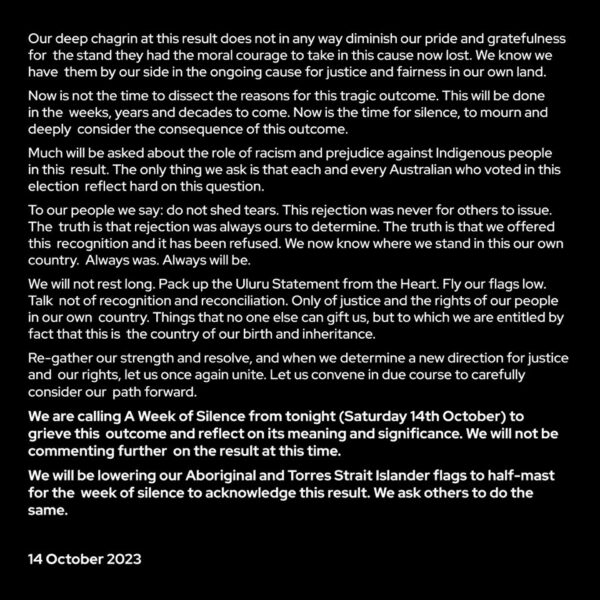
The elected grass-roots representatives of remote communities in Central Australia today took time out of their council meeting near Uluru to vote Yes to a voice to parliament.
Central Land Council delegates who had not yet voted in their remote communities cast their votes at the very place where Aboriginal leaders from around the country voted on the Uluru Statement from the Heart in May 2017.
“I was here six years ago, when we invited Australians to join us on a journey towards voice, treaty and truth-telling,” CLC delegate and Uluru traditional owner, Sammy Wilson, said after casting his vote in the building that hosted the Uluru Convention.
“Our council overwhelmingly voted Yes this morning because we know that when decision makers listen to our voices we end up with policies that help us, not harm us, and money is spent wisely.”
“The voice is our best hope in generations to turn our lives around,” CLC chair Matthew Palmer said.
“It won’t come again in my lifetime, and I ask to you all to write Yes for all our children when you go into that voting booth.”
CLC executive member Barbara Shaw was one of the delegates at the Uluru Convention and has worked against family violence in Alice Springs town camps with the Tangentyere Women’s Safety Group.
“I have waited all my life for this moment, but I’ll wait a little longer so I can vote Yes in my home town of Alice Springs on 14 October,” Ms Shaw said.
“The No campaign of fear, scaremongering and lies has hurt and confused many, including Aboriginal people,” Ms Shaw said.
“It reminds me of John Howard’s threats that people would lose their back yards if native title got up. He was pitting Australians against Australians for base political gain, and the No campaign is no different.
“I appeal to you to ignore the No camp’s talk of war and focus on what’s actually on the ballot – an advisory body to help us achieve outcomes together,” she said.
“Please accept our simple offer of peace and unity. Walk with us for a better future where our families can live in harmony and children can play on a level playing field.”
Council members undertook a round-trip of some 20 kilometres from their meeting on the land trust surrounding Uluru to cast their votes at the resort town of Yulara.
Contact: Elke Wiesmann | 0417 877 579| media@clc.org.au
The Central Land Council wants 14 October to become a date of which Australians from all walks of life can be very proud.
“Let’s make this a date on which future generations will look back and remember that they are doing so much better since they stopped ignoring the solutions our people have to offer,” CLC chief executive Lesley Turner said.
“Let them remember that was because the country decided to hear what our people have to say before laws and policies are made that affect them.
“Nowhere will this be more obvious than in the Northern Territory, where our people desperately want to be heard because, right now, they are going backwards.”
“14 October will become the anniversary when we will celebrate how we started to turn around what wasn’t working and when we began our united, respectful and successful journey towards a better future,” he said.
The CLC’s 90 elected grass roots members represent remote communities across the southern half of the Northern Territory and overwhelmingly support a Yes vote in the referendum.
“Our council has called for a voice for decades, yet lately the people they represent have been subjected to an unprecedented scare campaign about the referendum,” Mr Turner said.
“We will continue our community information campaign about the voice, dispel misinformation and disinformation, and help our constituents to enrol ahead of the referendum.
“We will also get ready for what will be a historic council meeting on 3-5 October at the Yulara Pulka homeland near Uluru, where the last leg of this long journey started in 2017.”
Contact: Sophia Willcocks | 0488 984 885| media@clc.org.au
The four Northern Territory Aboriginal land councils today signed the Barunga Voice Declaration that addresses all Australians and urges them to support a Voice to Parliament.
More than 200 representatives of the Northern, Central, Tiwi and Anindilyakwa land council are gathered on the traditional lands of the Bagala (Jawoyn) group at Barunga, south-east of Katherine. Land council members signed the Declaration and a copy was then presented to the Minister for Indigenous Australians, the Hon Linda Burney MP.
The 2023 Barunga Voice Declaration calls “for the recognition of our peoples in our still young constitution by enshrining our voice to the parliament and executive government, never to be rendered silent with the stroke of a pen again”.
It invites all Australians to “right the wrongs of the past and deal with the serious issues impacting First Nations peoples…and unite our country”.
Together, the land council members speak with the authority as the elected representatives of tens of thousands of grass roots residents of remote communities, town camps and towns across the Territory.
Quotes from land council chairs
Northern Land Council chair, Samuel Bush-Blanasi: “I am very proud the NLC is hosting this historic meeting at Barunga. We are standing strong together as we continue our long struggle. We speak for our clans, communities and our families, asking all Australians to support us and vote ‘Yes’ so we can finally be respected as equals.”
Central Land Council chair, Matthew Palmer: “Most Aboriginal people, not just here in the Territory, want a voice to power. Please don’t let the nay-sayers in Canberra confuse you and support us by voting ‘yes’.”
Anindilyakwa deputy chair, Thomas Amagula: “The call for constitutional recognition and a voice to parliament is about respect and coming together as a country to build a future we can all be proud of. This is what those old leaders started back in 1988 and we stand here today to carry on the spirit of their legacy.”
Tiwi Land Council chair, Gibson Farmer Illortaminni: “Through the proposed referendum and the establishment of a voice to parliament, we, the Tiwi people, want to be at the table when decisions are made that affect our land, culture, and future. I urge all Australians to join us in embracing this opportunity for positive change and vote ‘Yes’ to ensure our voices are heard and respected when important decisions are being made that affect us.”
The Declaration honours past leaders and the 1988 Barunga Statement that called for the recognition of Aboriginal rights and culture, that was presented to former prime minister Bob Hawke by NLC chair Yunupingu and CLC chair Wenten Rubuntja 35 years ago.
The Barunga Declaration
We, members of the four Northern Territory Aboriginal land councils, acknowledging our elders and old people, have gathered again at Barunga, the site of the historic Barunga Statement in 1988 and the Barunga Agreement in 2018, with pride in our own laws, cultures and ceremonies, looking to the future.
We, who have been dispossessed and subjected to punitive controls by governments, who have never ceded sovereignty over our lands and waters, resolve with one heart our determined support for the implementation of the Uluru Statement from the Heart in full.
We must right the wrongs of the past and deal with the serious issues impacting First Nations peoples, empower First Nations peoples and unite our country.
We call for the recognition of First Nations peoples in our still young constitution by enshrining our voice to the parliament and executive government, never to be rendered silent with the stroke of a pen again.
We need to be heard and urge our fellow Australians to stand with us and vote ‘yes’ in the forthcoming referendum, for the sake of a better future for all of us.
The declaration pays homage to the original Barunga Statement design and honours the cultural leaders who created it in 1988 (listed below), including sole survivor, pre-eminent artist Mr Djambawa Marawilli AM
- 1988 Barunga Statement artwork created by:
- Yunupingu AM, 1948-2023, Gumatj
- M Marawili, c.1937-2018, Madarrpa
- B Marawili, 1944-2002, Madarrpa
- D Marawili AM, 1953, Madarrpa
- D Ngurruwuthun, 1936-2001, Munyuku
- D Ngurruwuthun, c. 1940-2001, Munyuku
- W Rubuntja AM, c. 1926-2005, Arrernte
- L Turner Jampijinpa, 1951-2009, Warlpiri
- D Williams Japanangka, 1948-2013, Warlpiri
Contact: NLC Francine Chinn 0427 031 382 l CLC Elke Wiesmann 0417 877 579
A meeting of the Northern Land Council and Central Land Council has passed a resolution with overwhelming support endorsing a call to all Australians to support a Voice to Parliament.
It is expected a declaration will be signed by more than 200 representatives of the four Northern Territory Aboriginal land councils at a gathering this week on the traditional lands of the Bagala (Jawoyn) group at Barunga, south-west of Katherine.
Together, the land council members speak with the authority as the elected representatives of tens of thousands of grass roots residents of remote communities, town camps and towns across the Territory.
The text of a declaration will be released after it has been formally presented to the Minister for Indigenous Australians, the Hon Linda Burney MP, following the Minister’s address to the gathering on Friday morning.
Contact: NLC Francine Chinn 0427 031 382 l CLC Elke Wiesmann 0417 877 579
The Central Land Council’s 90 members said Senator Price neither speaks for them nor listens to them.
“She needs to stop pretending we are her people,” said CLC deputy chair Warren Williams, from Yuendumu.
Meeting this week at Spotted Tiger, near Atitjere (Harts Range), council members said they are community leaders and senior cultural men and women who speak for the communities that elected them.
The members are sick of Senator Price’s continued attacks on land councils and other peak Aboriginal organisations in the Northern Territory.
“We are tired of her playing politics with the grass roots organisations our old people have built to advocate for our rights and interests,” Mr Williams said.
“Her people are the non-Aboriginal conservatives and the Canberra elite to which she wants to belong.”
“She should tell us what her grievances with the CLC are, and if she can really and truly listen to us she is welcome to attend our next council meeting.”
The council is well aware of the scale of the challenges its members and their families face and welcomes anyone who is willing and able to work with them.
“We have many good men and women who are trying hard to make our communities better places, who are desperate to be heard, and Senator Price’s divisive approach isn’t helping,” Mr Williams said.
He said by generalising about Aboriginal people without any evidence and authority, Senator Price is hurting Aboriginal people.
“Our kids are the apples of our eyes,” Mr Williams said. “We are not abusers. We love our children. We’d like to know where she got her information from. It is mandatory to report such evidence to the authorities.
“We can do without self-appointed lone crusaders who are unable to bring people of good will together.”
There are many better qualified Aboriginal people, with decades of experience, who have been putting forward solutions for the care, protection and education of children who need a strong voice in Canberra.
Lajamanu community leader Valerie Patterson said Senator Price was misrepresenting the support for the voice in remote communities.
“I am a Warlpiri woman and I will vote yes because I believe that having the right to be heard by the parliament and the government will open a door for our children,” Ms Patterson said.
“Senator Price should support us, not tell lies about us.”
“The voice comes from the people,” Mr Williams said. “It’s a big opportunity for us. It opens everything up for us.
“There’s a lot of people who think the same thing. We want to go ahead with it. We will probably never have that chance again.”
Mr Williams said Senator Price needs to educate herself about the views of Yapa [Warlpiri for Aboriginal people].
“We’ve never seen her on communities. She needs to get down to the grass roots and find out the truth, not just speak with to the few people who will talk to her.”
Contact: Sophia Willcocks | 0488 984 885| media@clc.org.au
Matthew Palmer, from Corkwood Bore outstation near Alice Springs, has been elected chair of the Central Land Council.
He follows in the footsteps of former CLC chair and Anangu youth worker Kunmanara Hoosan, who passed away late last year.
“My brother will always be in my heart,” Mr Palmer told the land council delegates at their meeting at Tennant Creek.
The former chair of Alice Springs native title representative body Lhere Artepe announced he will be campaigning for an Aboriginal voice to parliament.
“I want to put the voice of my people to the parliament. It’s time for us to have a say in the laws and policies that affect us,” he said.
“We’ve tried everything else -promises, petitions, marches – and nothing has closed the gap.
“I will campaign for a big yes vote in the referendum because when we are being heard we will achieve positive change on the ground, in Alice Springs and in the bush.”
The former court interpreter speaks Central Arrernte, Alyawarr and English.
“I’ve worked all my life, since I was 16, and it’s kept me out of trouble.
I have been looking after my people since my twenties.” Mr Palmer was one of the youngest CLC delegates ever when Alice Springs outstation residents chose him to represent them on the land council.
“I was busy and I loved it. I was on the executive and I’m happy to be back,” he said. Mr Palmer also plans to “talk up for better housing.
“It’s really important. We still live in a tin shed – me, my family, my children and their children”.
He grew up at Ltyentye Apurte (Santa Teresa) and believes it is important for people to tell the stories of where they were raised.
“We get the stories from our grandparents and I’m really proud of that.
We keep the land strong.” Warren Williams, from Yuendumu, remains the CLC’s deputy chair. The NT Electoral Commission carried out the election and the presiding officer was Northern Territory Aboriginal Investment Corporation co-chair Barbara Shaw.
The council also chose two CLC representatives for the grants committee of the NTAIC. Today’s council meeting will be followed by a meeting of the CLC’s 11-member executive committee tomorrow, which will discuss the council’s voice campaign.
Contact: Elke Wiesmann | 0417 877 579| media@clc.org.au
Download the PDF
The ignorance expressed about the voice is only surpassed by the lack of knowledge about the rigorous process that led us to it.
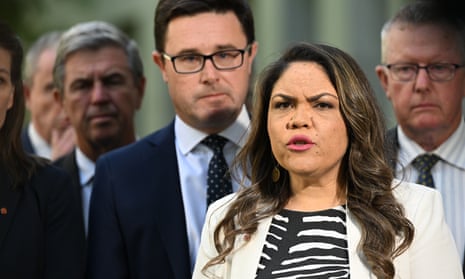
I wonder who Senator Jacinta Price is referring to when she talks of “my people”.
She can’t mean the people I work for – 90 democratically elected Aboriginal men and women from the towns, remote communities and hundreds of tiny homelands of the southern half of the Northern Territory. People aged between 20 and 80, who are elected for three-year terms, meet three times a year out bush and who, for the past five years, have consistently expressed their strong support for the constitutionally enshrined voice to parliament the senator opposes.
A voice that allows local representatives to be heard about laws and policies that affect them and offer solutions informed by their unique knowledge and lived experience. What could be more practical? What could be fairer, more modest and unifying?
View the full feature article online here
Aboriginal Peak Organisations NT (APO NT) have endorsed the Uluru Statement from the Heart and the Voice to Parliament at their final meeting of 2022.
The NT Intervention was discriminatory and left a lasting hurt on Aboriginal people across the Northern Territory. In response, in 2010, APO NT was formed to give Aboriginal people, communities and organisations their voice back.
“Given APO NT’s history in advocating for Aboriginal people and their right to self-determination, we fully support a Constitutionally enshrined Voice to Parliament. We have been part of the journey for the Uluru Statement from the Heart since the very beginning and continue to advocate for strong measures that honour our rights on this land. We know that the Intervention would have never happened if we had had a Voice to Parliament,” said Dr John Paterson, Chief Executive Officer of Aboriginal Medical Services Alliance NT.
“It is vital that everyone respects the long history of Aboriginal people seeking to have a say on matters that impact them. Just think of everything that has come from the Territory- Gwalwa Dariniki Petition, the Yirrkala Bark Petitions, the Barunga Statement. We are proud of our history of fighting for our sovereignty and for self-determination. The Uluru Statement from the Heart and the Voice to Parliament are further steps along the road – to a better future for all,” said Joe Martin-Jard, Chief Executive Officer of Northern Land Council.
“As Senator Patrick Dodson has explained, the bar for passing a referendum is high and we need non-Indigenous people to join us. We believe that what we are seeking is simple, fair and just. We want due recognition in the founding document of the Australian nation. We cannot wait any longer, history is calling,” said Phillip Brown, acting Chief Executive Officer of North Australian Aboriginal Justice Agency.
The four NT Land Councils held a historic meeting on Gurindji country, on Thursday, 25 August 2022.
Executive Council Members discussed a range of topics including Uluru Statement from the Heart, Voice to Parliament, Northern Territory Treaty, how to address the poor turnout in remote Aboriginal communities at the last election, remote housing and homelands and imminent rent increases for remote communities planned by the Northern Territory Government, and township leasing arrangements on Aboriginal land under the Aboriginal Land Rights (Northern Territory) Act 1976.
Chair of the Central Land Council, Mr Robert Hoosan, said he was proud to host Executive Council Members from Tiwi Land Council, Anindilyakwa Land Council and Northern Land Council at Kalkaringi.
“Gurindji Country is the birthplace of Land Rights and this week the anniversary of the Wave Hill Walk Off. History was made 56 years ago this week and history was made again today,” Mr Hoosan said.
Senator Patrick Dodson, Special Envoy for Reconciliation and the Implementation of the Uluru Statement, and Member for Lingiari, Marion Scrymgour, spoke about a range of matters including the Voice to Parliament. The combined Executives passed a resolution supporting implementation of the Uluṟu Statment from the Heart in full and changing the Australian Constitution to enshrine a Voice to Parliament within this term of Government.
Chairman of the Northern Land Council, Mr Samuel Bush-Blanasi said he was proud to support this historic resolution. “We have been waiting too long for the Voice. I heard Prime Minister Albanese speak at Garma about changing the Constitution to recognise Aboriginal and Torres Strait Islander peoples. I’m glad to see things are moving forward again.”
Representatives from the Australian Electoral Commission were also invited to attend to address Executives Members on how to ‘close the gap’ in voter enrolment and participation rates between urban and remote areas of the NT and other states.
Mr Gibson Farmer-Illortaminni said this is an important issue. “I heard today as many as 25,000 Territorians are not enrolled to vote. We need to do better. This is about getting our young men and women involved and educating our people about having a say in elections for the Territory and Commonwealth governments,” Mr Farmer-Illortaminni said. “Things are not much better for older people, the system often fails them too.”
The Executive Council Members also discussed funding for remote housing and the Northern Territory Government’s plans to impose a large increase in rent in remote Aboriginal communities commencing in September. Members passed a resolution calling on the NT Government to implement a moratorium on the rent increase until further consultations have occurred on the rent framework, a permanent subsidy is put in place and rates per room are brought into line with levels proposed in consultations in 2018.
Council Members also welcomed the Government’s $100 million election commitment for NT homelands. Members passed a resolution seeking a commitment from the Commonwealth Government to ongoing funding for homelands and to co-design a process for the distribution of homelands funding.
“This is important for all Aboriginal people on homelands and for Aboriginal people in the Anindilyakwa region,” Mr Thomas Amagula, Deputy Chair of Anindilyakwa Land Council, said.
The combined Executives also discussed township leasing arrangements on Aboriginal land. Chairman of the Northern Land Council noted that funding for townships leases and the cost of administering these leases comes from the Aboriginals Benefits Account.
“The Government should pay for this somewhere else. It should not come from ABA – that is Aboriginal money,” said Mr Bush-Blanasi. Executive members agreed to send a delegation to Canberra to discuss these issues with Minister Burney, Minister McCarthy, Senator Dodson and Member for Lingiari, Marion Scrymgour.
Download the PDF
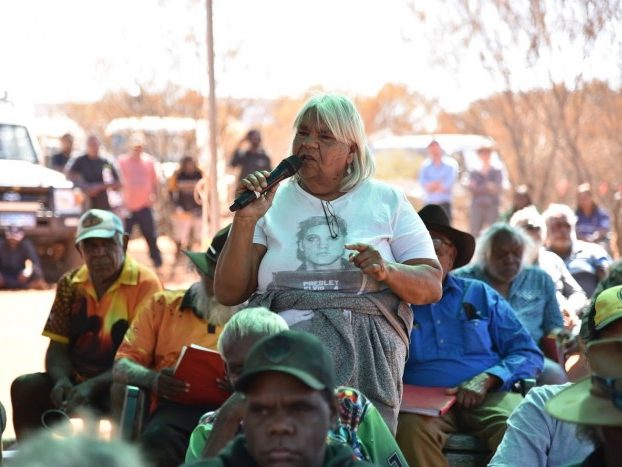
The Central Land Council has rejected a legislated Aboriginal voice to parliament.
Meeting at an outstation near Uluru today, the delegates passed the following resolution unanimously:
“Council sees that governments change.
We are the Aboriginal voice of central Australia. We are tired of government changing laws that affect our lives.
Our laws were here first, they are the original laws of this land.
Our systems of governance are still strong. Our voice needs to be embedded in the foundations of this nation.
We reject symbolic recognition in the constitution.
We want to be part of designing the voice to parliament. We demand that it be protected in the constitution.”
The CLC delegates heard from former Referendum Council members Professor Megan Davis and Pat Anderson, and Anangu leader Sally Scales before they debated the resolution.
They were concerned that a legislated voice can be abolished by the stroke of a pen.
“The abolition of ATSIC is still fresh in the minds of our members,” CLC chair Sammy Wilson said.
“This government will be struggling to win over Aboriginal people in the heart of the nation for its plans.”
For images of the council meeting go to http://tiny.cc/3u6bfz
MEDIA CONTACT: Elke Wiesmann | 0417877579| media@clc.org.au
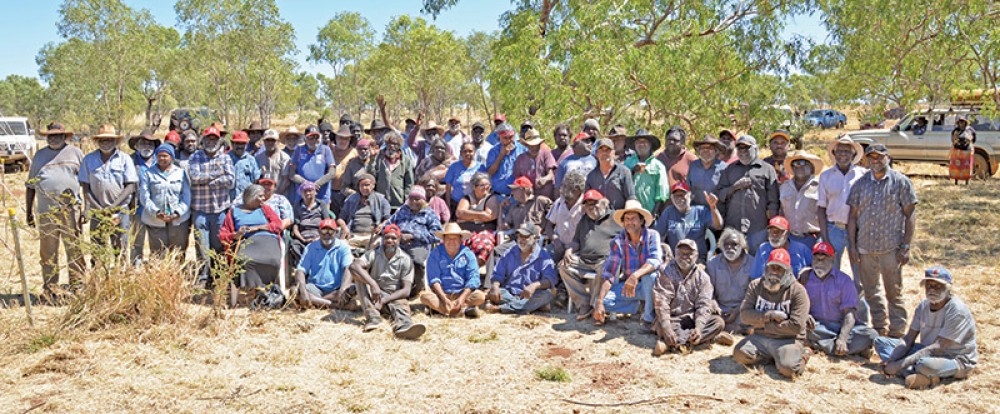
Central Land Council delegates have endorsed the historic Uluru Statement and demanded an active role in designing the ‘voice to parliament’ ahead of a referendum on constitutional reform.
Meeting at Brumby Plains, a remote outstation four hours north-west of Kalkaringi, more than 70 elected CLC delegates discussed the double-edged sword that is the ‘races power’ of the Australian constitution.
It has delivered them land rights but also the failed Intervention.
The delegates released the Brumby Plains Statement, saying they need to be part of designing an Aboriginal body advising the Australian Parliament in order to ensure it represents remote community residents and acts as a powerful voice against racially discriminatory laws:
“We, the members of the Central Land Council are sovereign people drawing our strength and laws from country. We sing for country, we dance for country and our laws and systems of governance are still strong.
The Australian constitution must recognise us as First Nations of Australia. Nothing will be lost, instead Australia will gain 65,000 years of culture and history.
We endorse the Uluru Statement, which calls for constitutional protection for a voice to Parliament, supports treaty making and truth telling.
We have long called for Aboriginal self-determination and Aboriginal self-government, and greater control over our own communities. Local treaty negotiations should be protected by a national treaty framework.
In the NT we have benefited from the Commonwealth ‘races power’ through the enactment of the Aboriginal Land Rights Act.
We have also experienced the worst of the ‘races power’ with the imposition of the racist NT Intervention. The Australian Parliament should not pass racially discriminatory laws that harm our people.
We want to be part of designing the voice to parliament to ensure it represents people from the bush, and to ensure it is powerful.
This work should be progressed before we go ahead with a referendum.
A successful referendum requires the support of non-Indigenous people, and we invite all Australians to join us on this journey to achieve constitutional reform.”
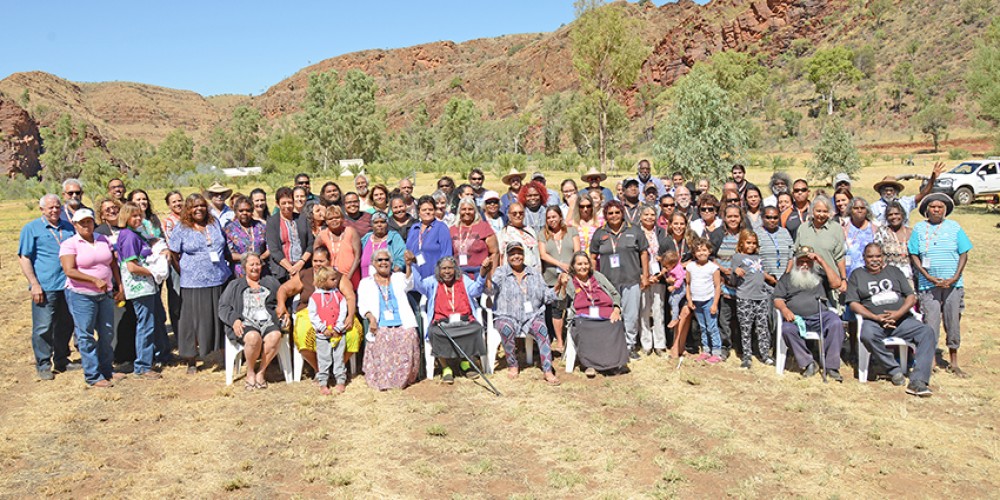
A meeting of around 100 Central Australian Aboriginal delegates at Ross River, east of Alice Springs, yesterday elected 10 representatives to argue for substantive constitutional change on a national stage.
The three-day meeting chose Richard James, Barbara Shaw, Geoffrey Shannon, Owen Torres, Valda Shannon, Pat Brahim, Jody Kopp, Rachel Perkins, Natasha Abbott and Damien Williams to represent the region’s priorities for meaningful constitutional reform at the national convention at Uluru on 24-26 May.
The meeting supported a statement of acknowledgement in the constitution, dealing with the race power in a way that prevents discriminatory law making, a representative voice to parliament, prohibition of racial discrimination and treaty.
“I was so pleased to see everyone grab this opportunity with both hands and get involved,” said Central and Council director David Ross.
“It was one of those great moments where everything fell into place and everyone, young and old, participated. The interpreters at the meeting did a great job of translating complex legal ideas.”
Mr Ross said the meeting was respectful with everyone having an opportunity to voice his or her opinions.
“Having male and female co-chairs and local facilitators helped to make everyone comfortable,” he said.
Barbara Shaw, the general manager of Anyinginyi Health in Tennant Creek, chaired the meeting with Mr Ross.
She said the meeting elected mostly young and middle aged people to seek consensus at Uluru on a referendum question to put to all Australian voters.
“I was quite overjoyed that we had a number of young people who had the confidence to stand up and make comment. They want to learn more. They were really engaged and really excited to be part of this journey,” Ms Shaw said.
“One of the things that were quite moving was that we had a lot of people who were starting to get the fire back in the belly,” she said.
“They were saying ‘this is the first time we were able to get together from all around the country to talk about an issue that is important to all of us’.”
The 10 delegates plan to meet in the coming weeks in order to prepare for the Uluru convention.
The Referendum Council last year asked the CLC to help organise both the Ross River and the Uluru gatherings, following the CLC’s request in 2015 to former Prime Minister Tony Abbott for an Aboriginal-only meeting in its region.
One of 12 so-called First Nations Regional Dialogues across the country, the Ross River meeting was a chance for Central Australians to debate their preferences for constitutional reform
CLC delegates last November helped to draw up a list of 100 invitees, including traditional owners, Aboriginal organisations and individual women and men.
The CLC’s Dr Josie Douglas and Francine McCarthy facilitated workshops along with Peter Renehan, Mischa Cartwright and Graham Dowling.
The Central Land Council has made sure local Aboriginal people will get a chance to have their say about the referendum on the constitutional recognition of indigenous people at a regional meeting near Alice Springs, as well as a national convention at Uluru.
Central Australia’s so-called First Nations Regional Dialogue will go ahead 31 March – 2 April at Ross River, east of Alice Springs, following a decision by the CLC members to help organise both gatherings.
One of 12 meetings across the country, the Ross River meeting will be a chance for participants to debate what the referendum question should cover.
The CLC wrote to former Prime Minister Tony Abbott in 2015, asking for an Aboriginal-only meeting in its region.
CLC delegates agreed to a request by the Referendum Council for the CLC to provide facilitation and logistical support for the meeting and helped to draw up a list of 100 invitees.
“Traditional owners, Aboriginal organisations and individuals all need to be represented,” said CLC director David Ross.
“The Referendum Council also wants us to facilitate a mix of ages, genders and regions.”
Mr Ross and Barbara Shaw, the general manager of Anyinginyi Health in Tennant Creek, agreed to chair the meeting while the CLC’s Dr Josie Douglas and Francine McCarthy will facilitate workshops along with Karl Hampton, Misha Cartwright and Joe Carter.
“The workshops are an opportunity for participants to deliberate on their preferences for recognition but they are not expected to make a final decision,” Mr Ross said.
Each regional dialogue meeting will be asked to send five participants to the national convention at Uluru in April 2017.
The convention will consider the referendum proposal and seek consensus on the question to be put to all Australian voters.
The proposal follows meetings of indigenous leaders in Broome, Thursday Island and Melbourne in the middle of the year which decided how to run the regional dialogues and the national convention and advised politicians not to rush the process.
CLC and NLC delegates passed the following resolution at their joint meeting at Kalkaringi in August 2016:
“We reaffirm our commitment to the principles set out in the 1988 Barunga and 1998 Kalkaringi Statements.
Constitutional reform must deliver meaningful and enduring benefits for our peoples. We are prepared to examine models for constitutional recognition that deliver such benefits.
Indigenous constitutional forums must be held in the NT involving Aboriginal people in the bush.
Any progress towards constitutional recognition must not endanger our rights to negotiate treaties to finally achieve self-determination.”
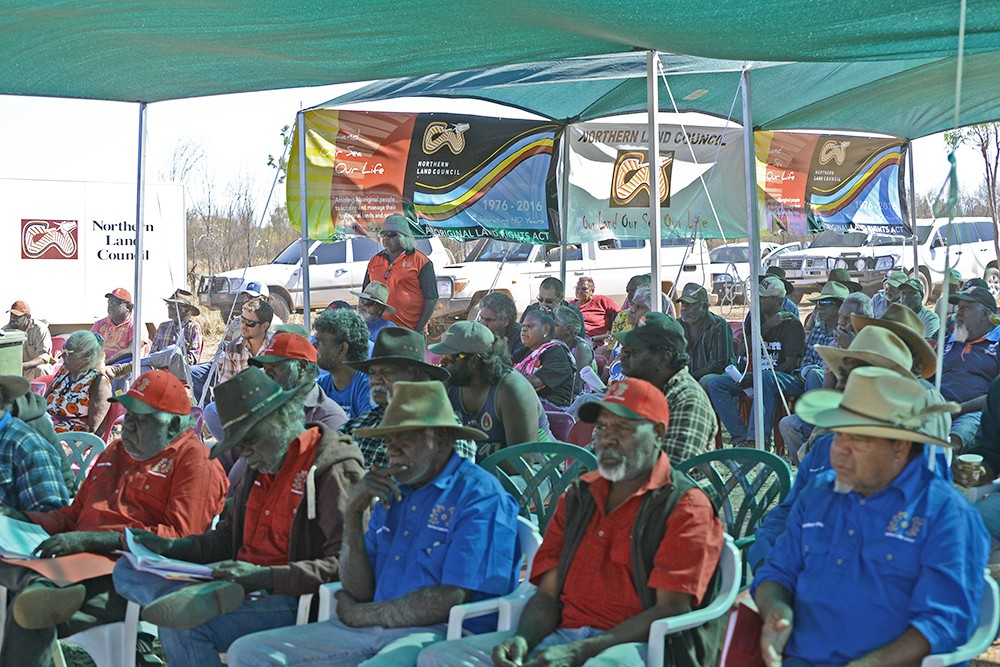
A historic meeting of the delegates of the Central and Northern land councils at Kalkaringi today agreed on a shared position on constitutional recognition.
The delegates passed the following resolution:
“We reaffirm our commitment to the principles set out in the 1988 Barunga and 1998 Kalkaringi Statements.
Constitutional reform must deliver meaningful and enduring benefits for our peoples.
We are prepared to examine models for constitutional recognition that deliver such benefits.
Indigenous constitutional forums must be held in the NT involving Aboriginal people in the bush.
Any progress towards constitutional recognition must not endanger our rights to negotiate treaties to finally achieve self-determination.”
